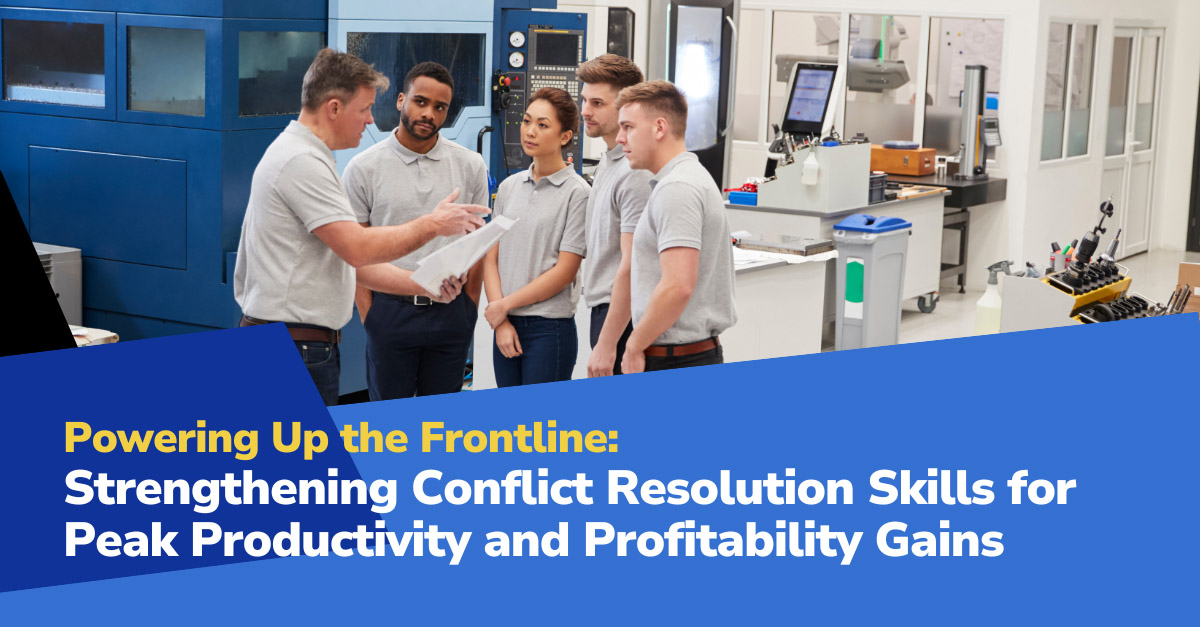
Downtime isn’t just costly, it’s preventable. One often overlooked cause? Unresolved conflict. Whether it’s a disagreement between team members, a breakdown in communication between shifts, or mounting frustration from misaligned expectations, conflict can silently eat away at productivity and morale.
That’s why conflict resolution isn’t just a “soft skill”, it’s a critical frontline competency that directly supports operational performance.
Supervisors and managers who are equipped to address tension, mediate disputes, and restore alignment in real time help stabilize production and reduce costly disruption. These leaders aren’t just keeping the peace, they’re protecting output, reinforcing accountability, and driving measurable value across the organization.
Below are 10 key ways that effective conflict resolution skills among frontline leaders create meaningful results in manufacturing:
1Reduced Downtime:
Unresolved interpersonal issues can stall collaboration, cause communication breakdowns, or slow response times to critical tasks. When frontline leaders intervene early, they keep issues from escalating into delays, and ensure that production doesn’t grind to a halt due to avoidable friction on the floor.
2Decreased Turnover Costs:
High employee turnover remains one of the most expensive hidden drains on manufacturing profitability. A conflict-ridden environment can push skilled workers out the door, often without warning. When leaders can manage tension and resolve misunderstandings, employees are more likely to feel respected and stay engaged, reducing the ongoing costs of hiring, training, and productivity loss from vacant roles.
3Enhanced Team Collaboration:
Teamwork in manufacturing isn’t optional, it’s the backbone of safe, efficient operations. Frontline leaders who foster trust and create open lines of communication enable teams to align around shared goals. Conflict resolution clears the path for smoother handoffs, better cross-functional interaction, and less friction between roles or shifts.
4Lower Absenteeism:
Ongoing conflict can lead to burnout, stress, and disengagement, all of which show up in the form of frequent absences. A workplace that feels psychologically safe and supportive encourages people to show up, stay focused, and contribute consistently. Reducing interpersonal stress is a practical way to keep attendance and output high.
5Improved Decision-Making:
Diverse teams bring different perspectives to problem-solving. But when conflict is mismanaged, those differences turn into division. Skilled leaders can distinguish between destructive conflict and healthy debate, allowing the team to surface insights, challenge assumptions, and make better-informed decisions that drive real operational improvements.
6Reduced Legal Costs:
HR escalations, labor grievances, and workplace investigations don’t just cost time, they can come with hefty legal and compliance risks. Leaders trained in conflict resolution help prevent these issues before they escalate. A consistent, respectful approach to resolving disputes reinforces organizational policies and keeps problems from turning into liabilities.
7Increased Employee Morale:
Conflict doesn’t just hurt productivity, it takes a toll on how people feel about their jobs. When leaders handle issues directly and fairly, employees are more likely to feel supported, valued, and motivated. That morale boost shows up in performance, retention, and a stronger sense of ownership on the floor.
8Improved Quality of Work:
When teams are distracted by interpersonal issues, attention to detail drops. Mistakes increase. And quality suffers. A well-functioning team, free from tension and mistrust, can focus fully on tasks, follow procedures more precisely, and deliver work that meets or exceeds production standards.
9Enhanced Reputation:
Reputation matters, not just with customers, but within the workforce and industry at large. Plants known for having stable, supportive work environments attract stronger talent, retain their top performers, and build better vendor and community relationships. Conflict resolution contributes directly to the kind of culture others want to be part of.
10Operational Efficiency:
Every time a supervisor has to call HR or escalate a minor dispute, it takes time away from managing the line. Leaders who are confident and capable in resolving small conflicts on their own reduce reliance on upper management and keep operations running smoothly. Over time, that efficiency compounds, in uptime, focus, and overall performance.
Conclusions for Senior Leader
If your frontline leaders aren’t trained in conflict resolution, you’re leaving productivity, and profitability, on the table. Developing this skill doesn’t just reduce friction on the floor; it accelerates performance across the operation. By empowering supervisors to tackle tension proactively and constructively, you’re building the leadership muscle needed to sustain output, reduce costs, and improve your competitive edge.
The POWERS Difference
At POWERS, we help manufacturers close the gap between leadership behavior and operational results. One of the most effective ways we do this is by strengthening conflict resolution skills among frontline leaders, not as an abstract soft skill, but as a daily operational tool.
Through our Digital Production System (DPS), we equip organizations with the structure, coaching, and support to drive consistent behaviors that improve productivity, reduce risk, and enhance accountability at every level. Conflict resolution is a key part of that system, built into how leaders manage their teams, respond to breakdowns, and keep performance on track.
Our team has partnered with executive leadership across industries to drive measurable improvements in uptime, retention, quality, and throughput, all while building a more resilient and capable workforce.
To put our experienced team and proven track record to work for you, schedule an initial discovery and analysis by calling +1 678-971-4711 or emailing us at info@thepowerscompany.com.
Continue Reading from the Mastery Series
- Part 1 - Strategic Alignment that Bridges Daily Tasks with Broader Visions for Unified Organizational Success
- Part 2 - Crafting Clarity through Effective Communication and Active Listening
- Part 3 - Sharpening Decision-Making Prowess for Seamless Operations and Minimal Downtimes
- Part 4 - Championing Lean Principles for Streamlined Success and an Ever-Evolving Workplace
- Part 5 - Mastering Performance Management for Optimal Team Output and Growth
- Part 6 - How Leaders Well-Trained in the Soft Skills Transform Manufacturing Teams
- Part 7 - Strengthening Conflict Resolution Skills for Peak Productivity and Profitability Gains
- Part 8 - Unleashing Potential with Precision Time and Resource Management
- Part 9 - Safety First for Sustainable And Scalable Productivity And Profitability
- Part 10 - Equipping Your Shop Floor Leaders to Be Effective Change Managers







